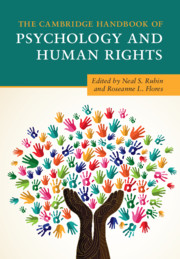Book contents
- The Cambridge Handbook of Psychology and Human Rights
- The Cambridge Handbook of Psychology and Human Rights
- Copyright page
- Dedication
- Contents
- Figures
- Tables
- Boxes
- Contributors
- Acknowledgments
- The Core International Human Rights Instruments and Their Monitoring Bodies
- Universal Human Rights Instruments
- Sustainable Development Goals
- Glossary of United Nations and Psychology Acronyms in the Handbook
- Introduction
- Part I History of Human Rights
- Part II The Intersection of Psychology and Human Rights
- 5 The Intersection of Psychology and Human Rights in Addressing Racism, Discrimination, and Xenophobia
- 6 Poverty and the Human Rights of Children and Youth through the Lenses of Psychology and Sociology
- 7 Labor Rights as Human Rights
- 8 Whose Culture? Challenging the Idea of an Opposition between Women’s Human Rights and the Right to Culture
- 9 Human Rights
- 10 Child Rights
- 11 Human Rights of Persons with Disabilities
- Part III Contemporary Issues in Psychology and Human Rights
- Part IV Teaching, Research, and Training in Psychology and Human Rights
- Part V Future Directions
- Index
- References
7 - Labor Rights as Human Rights
The Role of the Organisation for Economic Co-operation and Development’s (OECD’s) Responsible Business Conduct Guidelines
from Part II - The Intersection of Psychology and Human Rights
Published online by Cambridge University Press: 02 October 2020
- The Cambridge Handbook of Psychology and Human Rights
- The Cambridge Handbook of Psychology and Human Rights
- Copyright page
- Dedication
- Contents
- Figures
- Tables
- Boxes
- Contributors
- Acknowledgments
- The Core International Human Rights Instruments and Their Monitoring Bodies
- Universal Human Rights Instruments
- Sustainable Development Goals
- Glossary of United Nations and Psychology Acronyms in the Handbook
- Introduction
- Part I History of Human Rights
- Part II The Intersection of Psychology and Human Rights
- 5 The Intersection of Psychology and Human Rights in Addressing Racism, Discrimination, and Xenophobia
- 6 Poverty and the Human Rights of Children and Youth through the Lenses of Psychology and Sociology
- 7 Labor Rights as Human Rights
- 8 Whose Culture? Challenging the Idea of an Opposition between Women’s Human Rights and the Right to Culture
- 9 Human Rights
- 10 Child Rights
- 11 Human Rights of Persons with Disabilities
- Part III Contemporary Issues in Psychology and Human Rights
- Part IV Teaching, Research, and Training in Psychology and Human Rights
- Part V Future Directions
- Index
- References
Summary
This chapter introduces the reader to the various guiding frameworks for responsible business conduct and how they relate to labor practices and labor rights within and across countries and cultures. The authors explain how and why the global community has found it necessary to address these issues as part of the movement to steer national and transnational corporations to uphold human rights and contribute to social development around the world. Key international instruments are introduced and discussed, such as the Organisation for Economic Co-operation and Development (OECD) Responsible Business Conduct (RBC) guidelines, the UN Guidelines on Business and Human Rights, and the ILO Tripartite Declaration of Principles Concerning Multinational Enterprise and Social Policy. An example is given that provides a concrete example of how the OECD guidelines are applied to a case of reported human rights abuse. The authors capture the significant components of the OECD RBC and associated guidelines from both social and organizational psychology perspectives and show how psychological knowledge and competence can strengthen the application of these international instruments for the protection of human rights and labor rights.
Keywords
- Type
- Chapter
- Information
- The Cambridge Handbook of Psychology and Human Rights , pp. 105 - 120Publisher: Cambridge University PressPrint publication year: 2020

